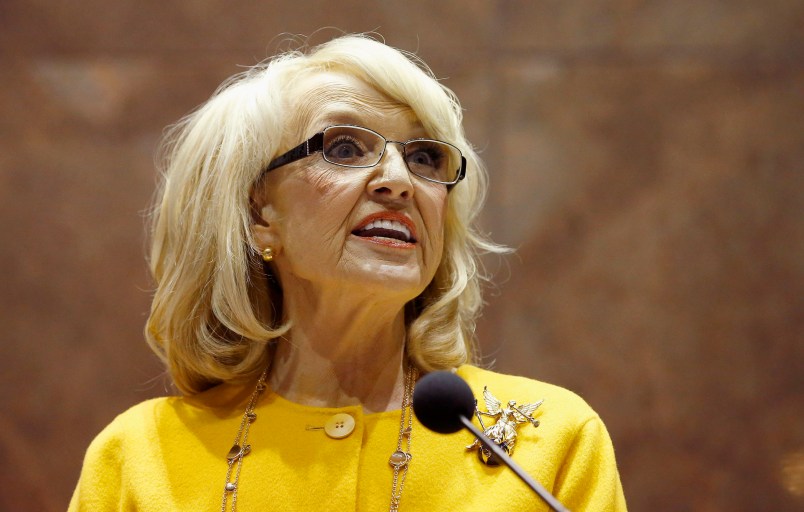A remarkable thing happened in Arizona recently. Businesses from Marriott to Apple to American Airlines urged Governor Brewer to veto SB 1062, the bill that would have granted businesses religious rights to refuse services to gays and lesbians. Public figures and politicians like Mitt Romney, Arizona’s two Republican senators, and even several state legislators who had themselves voted for the bill urged the same.
Once the NFL began making noises about moving the Super Bowl out of Arizona, it became clear: the attempt to permit for-profit corporations to use religion to discriminate based on sexual orientation or other grounds was too politically toxic to become law.
Fair-minded individuals around the country celebrated. And it’s not just Arizona. Mississippi and Kansas also recently put the brakes on bills that would have granted similar religious rights to corporations to discriminate or otherwise violate the law. But much of what these bills’ supporters have failed to achieve in Arizona and other states could still be handed to them by a Supreme Court majority in a matter of months.
On March 25, the Supreme Court will hear arguments in two cases in which for-profit corporations are asking to be exempted from the Affordable Care Act’s requirement that health insurance cover birth control with no out-of-pocket expense.
Hobby Lobby, an arts and crafts retail chain with about 13,000 employees nationwide, and Conestoga Wood, a cabinet and furniture manufacturer with close to 1,000 employees, assert that they have religious objections to providing their employees and employees’ dependents with insurance coverage for birth control.
Like the fight in Arizona, the Supreme Court cases are about the extent to which for-profit corporations can use religion to excuse refusals to comply with the law, even when their refusals harm third parties. But the Arizona bill and the Hobby Lobby and Conestoga Wood cases aren’t just conceptually linked. In fact, the owners of these corporations are asking the Supreme Court to interpret federal law so that it provides a key aspect of what the Arizona bill would have provided.
The proponents of the Arizona bill explained in interviews that they introduced it so that businesses could refuse to provide service to gay or lesbian customers. But the bill itself never mentioned sexual orientation; the primary thing it did was change Arizona’s existing religious exemptions law to vest corporations, partnerships, and other for-profit businesses with religious rights. In doing so, however, the bill would have given these for-profit businesses a license to ignore many state and local laws if the businesses claim the laws burden the business’s religious beliefs, unless applying the law in question to the business in that particular circumstance is the least restrictive means of furthering a compelling state interest.
Of course, this is much like what the owners of Hobby Lobby and Conestoga Wood are asking the Supreme Court to rule. They are arguing that, as corporations, they have rights under federal law to exercise religion and that as a result they can ignore the contraceptive coverage requirement. Specifically, they argue that providing an insurance plan that an employee might use to obtain birth control “substantially burdens” their corporate religion, and that the government does not have a compelling interest in applying the contraceptive coverage requirement to them.
In other words, if Hobby Lobby and Conestoga Wood win with this argument, the Supreme Court will have reinterpreted longstanding federal law to adopt at the national level a key goal of Arizona’s bill, empowering corporations across the country to discriminate against their customers and employees in many contexts based on the corporation’s ostensible religion, whether or not that discrimination would otherwise be illegal. As a result, if the Supreme Court decides an arts and crafts chain is capable of religious beliefs and thus can have a religious right to deny its employees insurance coverage for birth control, then airlines might be able to assert a religious right to pay men more than women, bakeries could assert a religious right to deny employees insurance coverage for vaccinations, hotels might be able to assert a religious right to refuse rooms to customers based on race, and restaurants could assert a religious right to refuse to serve gay couples.
Given the national furor when the Arizona legislature passed such a proposal, it would be troubling indeed if following Governor Brewer’s veto, the Supreme Court rejected decades of settled federal law to provide a corporate right to discriminate in the name of religion. Arizona’s governor did the right thing by recognizing that SB 1062 represented a radical and divisive approach that was wrong for the state, as did legislatures in Mississippi and Kansas when they set aside similar bills. The Supreme Court should not reshape federal law to craft a similarly radical and divisive rule for the nation.
Emily Martin is Vice President and General Counsel at the National Women’s Law Center, where she undertakes cross-cutting projects addressing women’s health, economic security, and education and employment opportunities. Jennifer C. Pizer is Law and Policy Project Director for Lambda Legal, the oldest and largest national legal organization committed to achieving full recognition of the civil rights of lesbian, gay, bisexual and transgender (LGBT) people and people living with HIV.






